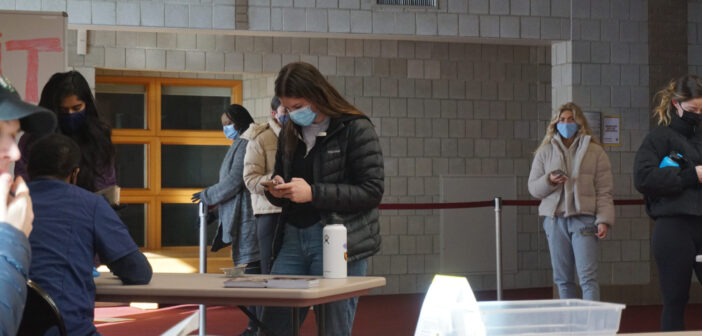Three years ago, Lehigh students logged onto Zoom from home for their final week of classes. Though classes and exams have been in person for the last two years, a hint of dissimilarity between pre-pandemic life and post-pandemic life hangs in the air for the class of 2023.
Amid the pandemic, college students from the classes of 2020-2025 faced varying levels of academic and social disruption.
The class of 2023 is the final group of students to have experienced pre-pandemic Lehigh.
Ric Hall, vice president of student affairs, was a member of Lehigh’s COVID Response Team. He said he believes all the implemented health and safety measures had the best interest of the university at heart.
Lehigh adhered to Centers for Disease Control and Prevention guidelines and used national, regional and local data to inform decisions throughout the pandemic. Hall said it seemed like there was always something new, so the COVID response team paid close attention to this data in addition to what was going on within Lehigh’s student, faculty and staff populations.
He said the initial measures taken in the spring of 2020 were canceling classes, shutting down administrative offices and sending everyone home. Then, the university transitioned to remote learning and began to decide how and when students, staff and faculty would be brought back to campus.
The following year, beginning in the fall 2021 semester, only incoming freshmen were allowed to live on campus, though normally the university requires both first- and second-year students to reside in on-campus residences.
“We wanted to de-densify the residence halls, so (the university) chose to only have 50% capacity in these buildings and chose to bring only freshmen back to campus,” Hall said.
He said the logic was that those first-year students hadn’t had an opportunity to experience residential Lehigh at all, whereas the class of 2023 had. However, he thinks it would have been a better experience for students if more of them lived on campus.
Justin Groothuis, ‘23, said the university’s decision was “shocking” and “everyone in (the class of 2023) was scrambling for housing.”
He said half his friends decided to live in South Bethlehem sophomore year and the other half studied from home.
Jason Schiffer, assistant vice president of Campus Safety, chief of Lehigh University police, and a member of Lehigh’s COVID Response Team, said most pushbacks came from the class of 2023 and their parents when only the class of 2024 was allowed on campus for the 2020-2021 school year because they felt it was unfair to them.
Schiffer noticed a larger spread of students living in South Bethlehem than normal and said he thinks students might have wanted to be near campus because there were still unknowns about reopening the university.
Groothuis said having to reside off campus as a sophomore was “awful,” and looking back, he wishes he had stayed home because he didn’t get much of a college experience that year.
Ozzie Breiner, director of Housing Services, said in an interview with The Brown and White there were approximately 2,500 students living off campus that year — a sharp increase from the 2,005 the previous year — and only 1,223 students lived on campus.
After a year of entirely remote instruction, the class of 2023 saw a shift toward normalcy as residence halls returned to full capacity and sorority and fraternity houses reopened their doors for the 2021-2022 school year.
Hall said the university tried to keep up with traditions, but things like Lehigh-Lafayette week looked different during COVID, and attendance at outdoor university events was far lower during these two years.
Groothuis was still able to study abroad in the spring of his junior year, as were many students from the class of 2023.
He said he feels horrible for the previous graduating classes who could not go abroad or were sent home early from abroad programs, and going to Florence was “the best decision” he’s made while at Lehigh.
Studying abroad was a great part of an otherwise unexpected college experience for Groothuis, who said his post-graduation plans would have been different if it were not for the pandemic.
After graduation, Groothuis will be working at a financial services firm outside of Philadelphia on a hybrid schedule — in the office two days a week and working remotely three days a week.
“(COVID) normalized working from home, which has been an unpleasant experience for me,” Groothuis said. “It’s important for me to have a separate work and home life.”
Schiffer said he feels for those who attended college during the pandemic, especially the classes of 2023 and 2024, as these are formative years of one’s life.
He said there’s something unique about a residential university experience compared to online.
“There’s so much learning and growing that takes place because of the community that you’re in — that our students are in — so there’s no doubt there are huge losses because of COVID across the board,” Schiffer said.
Hall said the class of 2023 showed remarkable resilience, and when everyone started to return to campus, there appeared to be a full embrace and willingness to maximize the undergraduate experience.
“(The class of 2023) will probably realize that they did grow in some significant ways, and they have a unique experience and a unique story to tell,” Hall said.






Comment policy
Comments posted to The Brown and White website are reviewed by a moderator before being approved. Incendiary speech or harassing language, including comments targeted at individuals, may be deemed unacceptable and not published. Spam and other soliciting will also be declined.
The Brown and White also reserves the right to not publish entirely anonymous comments.